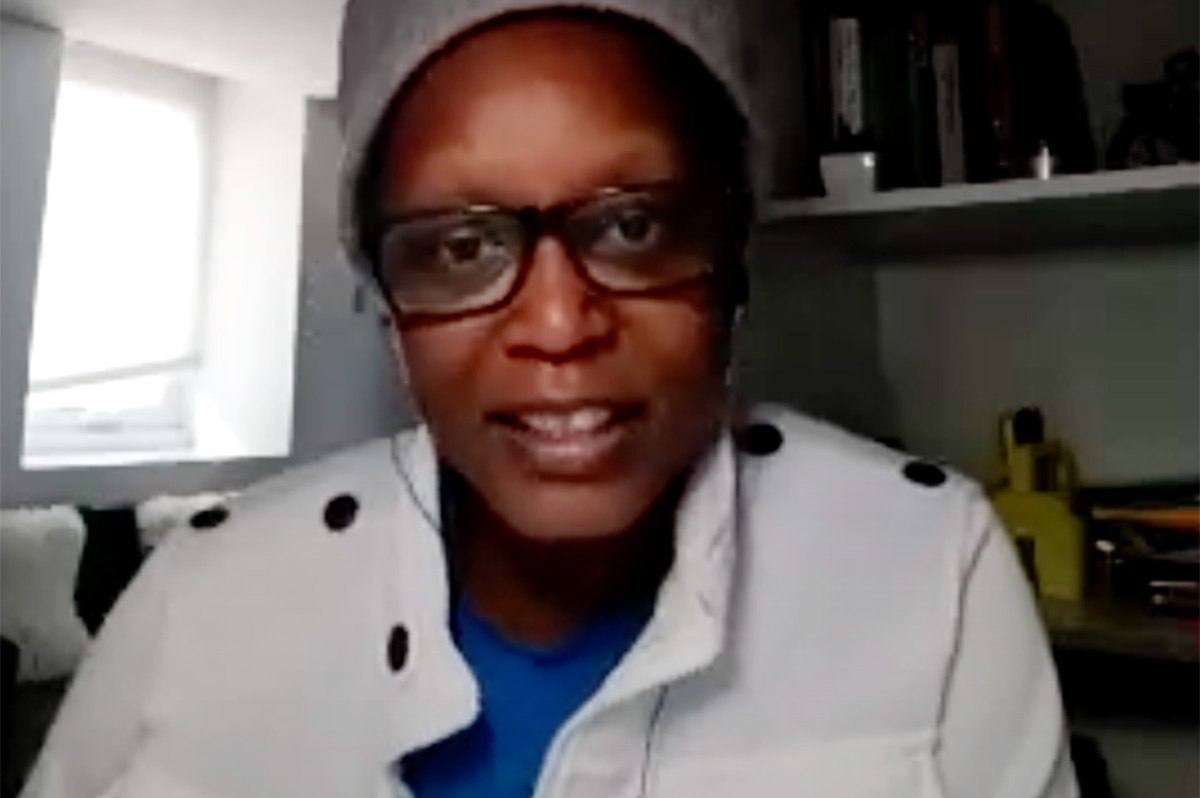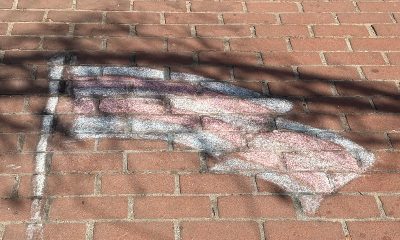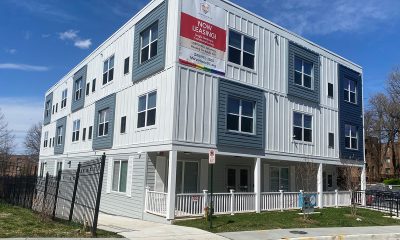Opinions
Project 2025: A threat to LGBTQ elders and inclusive America
We must fight for a diverse country that protects all its citizens

In recent months, Project 2025, a conservative roadmap for a potential second Trump administration, has gained significant attention. While its proponents claim it will bring efficiency and reform to governmental operations, a more in-depth read of the document reveals a disturbing agenda that threatens the progress made across various sectors in diversity, equity, and inclusion (DEI) initiatives, with particularly harmful implications for LGBTQ+ elders.
Project 2025 proposes a radical overhaul of federal agencies, with a specific focus on dismantling DEI programs. The plan views these initiatives as forms of “affirmative discrimination” and seeks to replace them with what it perceives as merit-based practices. This stance ignores the real-world benefits of DEI programs in creating more inclusive and equitable workplaces, particularly for marginalized communities like LGBTQ+ elders.
The proposal goes beyond merely eliminating DEI initiatives. It advocates for stripping workplace protections related to sexual orientation and gender identity from federal rules. This regressive move would leave LGBTQ+ individuals, especially older adults, vulnerable to discrimination in employment, healthcare, and housing – areas where they already face significant challenges.
LGBTQ+ older adults are particularly vulnerable to the negative effects of proposed changes in Project 2025’s anti-DEI stance. This population already faces unique challenges, including higher rates of social isolation, poverty, and health disparities compared to their non-LGBTQ+ counterparts. The removal of protections and DEI initiatives could exacerbate these issues significantly, leading to increased discrimination in healthcare settings and potentially poorer health outcomes. Furthermore, the elimination of programs promoting inclusivity and social interaction could deepen the isolation experienced by LGBTQ+ elders, who are more likely to live alone and have fewer avenues of family support.
The economic and housing implications of Project 2025’s stance are equally concerning for LGBTQ+ older adults. With fewer workplace protections, they may face increased employment discrimination, potentially worsening their already precarious economic situations. This reduction in economic security could have far-reaching effects on their quality of life and ability to access necessary resources. Additionally, the potential reduction in support for LGBTQ+-inclusive housing initiatives could make it substantially more difficult for elders to find safe, affordable, and LGBTQ+-friendly housing options, further compounding the challenges they face in their daily lives.
The potential negative impact of Project 2025 extends far beyond LGBTQ+ elders, threatening to create a less tolerant and less inclusive society overall. By attempting to erase the progress made in recognizing and addressing structural inequalities, Project 2025 risks turning back the clock on civil rights and social justice initiatives. This regression could have profound implications for marginalized communities across the board, undoing decades of hard-fought progress in creating a more equitable society.
As we face this looming threat to LGBTQ+ elders and DEI initiatives, it’s crucial that we take decisive action. This includes raising awareness by educating others about the potential impacts of Project 2025 on vulnerable populations, advocating by supporting organizations fighting to defend LGBTQ+ rights and DEI initiatives, and exercising our right to vote to ensure that our elected officials support policies that protect marginalized communities. Additionally, we must continue to promote inclusivity in our workplaces and communities by championing DEI efforts and creating welcoming spaces for all. By taking these steps, we can work together to counteract the potential harm of Project 2025 and maintain the progress we’ve made toward a more just and equitable society.
Project 2025 represents a significant threat to the progress we’ve made in creating a more conscientious society. Its anti-DEI stance would disproportionately harm LGBTQ+ elders, a group already facing numerous challenges. We must stand against these regressive proposals and continue to fight for a diverse, inclusive America that values and protects all its citizens, regardless of age, sexual orientation or gender identity.
Kylie Madhav is Senior Director of Diversity, Equity, and Inclusion of SAGE.
Opinions
D.C. leaders must show up for LGBTQ+ communities
Silence is not an option amid relentless attacks

At a time when D.C. and the LGBTQ+ community are under relentless attack, we cannot afford silence — or inaction. The DC LGBTQ+ Budget Coalition, a grassroots alliance of more than 20 LGBTQ-led and LGBTQ-serving organizations and individuals, is calling on Mayor Bowser, the D.C. Council, and every level of D.C. government to act with urgency and purpose in this year’s budget process to invest in our community. Our lives, our futures, and our rights are on the line — not just nationally, but here at home in the District. How D.C. as a city responds in the face of hate sends a powerful message to the rest of the country.
We formed this coalition because LGBTQ+ people in the District — especially Black, Brown, trans, disabled, and low-income residents — deserve more than token inclusion. We deserve policies, investments, and leadership that center our lived realities and deliver on equity. While Congress tries to strip D.C. of home rule and holds our budget hostage, our local government has the power — and responsibility — to lead.
We are not a performative alliance. We are a community-driven movement. From housing to healthcare to workforce development, we believe budgets are moral documents — and D.C.’s budget must reflect the values of equity, justice, and liberation.
National Context Demands Local Action
Just this year, members of Congress introduced damaging legislation to reverse D.C.’s home rule, stripping District residents of the fundamental rights of self-governance enjoyed by their own constituents. Additionally, the White House seeks to rule over us by executive order, issuing edicts to overturn our laws. Adding further insult to injury, extremists in the House of Representatives are holding $1.1 billion of D.C.’s own tax revenue hostage to their radical anti-democratic agenda.
Moreover, this administration continues its assault on diversity, equity, and inclusion initiatives, undermining civil rights protections across the country. We are not simply witnessing bureaucratic shifts; we are standing at the edge of a cliff, staring down a coordinated rollback of the very protections our communities have bled to secure.
Veterans of past queer liberation fights remind us that we’ve been here before. From the Lavender Scare to Stonewall to ACT UP, from the fight for marriage equality to the ongoing battle for trans rights, queer warriors have long known what it means to survive government neglect, societal backlash, and moral panic. Their testimonies warn us: This moment is severe. This moment is familiar. And this moment requires us to act.
These are not theoretical attacks. They are strategic, structural, and escalating. In this context, D.C. must serve as a model for sanctuary, resilience, and resistance. That means investing in communities — not abandoning them.
We know that our local leadership has, at times, moved preemptively to comply with federal executive orders — even when those directives run counter to our values. And while the mayor has publicly affirmed equity, housing, and inclusivity as core priorities, this moment demands more than words. We call on the mayor and District leaders to stand firm in those stated commitments and meet this moment with the clarity in the District’s budget. D.C. must not be a conduit for federal overreach, but a bulwark against it.
Our FY26 Priorities
In this year’s budget, we’re calling for the D.C. government to protect targeted investments in:
• Public Health: Restore and expand local funding to fill the dangerous gaps left by federal cuts to HIV prevention and mental health services. Ensure culturally competent care for LGBTQ+ residents, especially those with disabilities and chronic health conditions.
• Employment and Economic Equity: Sustain and grow workforce development programs for trans and gender-diverse (TGD) residents. Expand partnerships with employers and support entrepreneurial training by and for the TGD community.
• Housing: Invest in long-term housing solutions, including for LGBTQ+ youth and seniors, and protect programs like Emergency Rental Assistance Program (ERAP) and Tenant Opportunity to Purchase Act (TOPA) that keep people residents housed.
• Safety and Community Support: Fund LGBTQ+ survivor shelters and IPV/SA services, ensure disability and language access, and streamline government grant processes for community-based organizations.
We’ve outlined these and other priorities in our full FY26 Budget and Policy Platform, recently delivered to the Mayor and D.C. Council. But we know that a letter alone isn’t enough—we must take action.
We’re Organizing — and We’re Not Alone
In this past week, we launched a letter-writing campaign to mobilize D.C. residents to urge their Council members to prioritize LGBTQ+ budget needs. We are also releasing a citywide sign-on letter for partner coalitions and ally organizations to demand the same.
Our members are showing up at budget hearings, meeting with agencies, and organizing communities across all eight wards. And while we’re proud of the momentum, we need our community to join us. We need every resident, organization, and elected leader to get in this fight.
How You Can Get Involved
Here’s how you can join the movement:
• Individuals: Sign our Action Network letter to Council members and the Mayor.
• Testify or submit written testimony at budget hearings to uplift our priorities.
• Call and email your Council members — demand full inclusion of LGBTQ+ needs in the FY26 budget.
Together, we can ensure that D.C.’s budget reflects the lived realities and urgent needs of LGBTQ+ communities across all eight wards.
The question before D.C.’s leaders is clear: Will you choose to look the other way or will you join us in taking action?
Heidi Ellis is coordinator of the DC LGBTQ+ Budget Coalition. Erin Whelan is executive director of SMYAL (coalition member).
Opinions
LGBTQ elder voices matter now more than ever
Global Story Archive highlights often ignored perspectives

Kasha Nabagesera is widely regarded as the Mother of the Ugandan LGBTQ+ human rights movement. As one of the most prominent human rights activists of our time, she is no stranger to speaking publicly about her life. However, when I had the privilege of sitting down with her this February, she opened up about a part of her story that is often overlooked—or, even worse, ridiculed. Aging.
When Kasha turned 40, she began to notice a shift in how people viewed and spoke about her lived experience. In the years since, she has received hurtful and dismissive messages from younger LGBTQ+ people who believe her age renders her opinions and perspective irrelevant. These individuals fail to recognize that the sacrifices made by Kasha and other elders have paved the way for today’s young queer people to live their lives openly and proudly.
Disregard for LGBTQ+ elders is not just disrespectful—it’s a missed opportunity for connection at a time when solidarity among LGBTQ+ people is desperately needed. The number of anti-LGBTQ+ bills continues to rise in state legislatures across the U.S., and about one-third of the world’s countries, including 60 UN member states, still criminalize consensual same-sex sexual acts.
The reality is that our elders are true pioneers of the LGBTQ+ movement worldwide. They have survived decades of discrimination and state-sanctioned violence, leading them to face many unique challenges.
Many report having to “go back into the closet” to access care in later years, lack family support networks, and discrimination in housing and healthcare. LGBTQ+ older adults are also less likely to have retirement savings due to decades of employment discrimination.
Through these struggles, LGBTQ+ elders have developed remarkable wisdom, and their lived experiences can provide a roadmap for resilience in the face of new obstacles. But too often, we fail to listen to them, and their contributors are forgotten.
Over the last three and a half years as director of International Programs at SAGE, I have spoken with hundreds of elders worldwide about their lives and legacies. Most have shared similar experiences of ageism and a desire to pass on their knowledge to younger generations.
One of those elders is Reingard Wagnar, a 74-year-old lesbian and activist from Germany. She said that not only are older women in society rendered invisible anyway, but it is especially true for older lesbians. She wants people to know that elder LGBTQ+ folks are here, and they have much to share.
Another elder I had the honor of meeting, Kevin Mchawiro, is a Kenyan journalist and believes stories can also serve as a source of inspiration and that love does indeed win.
To collect, preserve, share and amplify the stories of elders like Kasha, Reingard, and Kevin, I created The Global Story Archive. Supported by SAGE and in collaboration with a global network of not-for-profit organizations and independent activists, this first-of-its-kind collection features the voices of dozens of LGBTQ+ elders who are eager to share their perspectives across generations and borders.
However, in the wake of Trump’s Executive Orders on Foreign Aid, the uncertainty of where funding and support lies, and what the future looks like, SAGE must close its global operations. This suspension is happening in tandem with the dismantling of foreign aid programs that advance the well-being of other underserved populations, including immigrants, women, and those burdened by disease.
The loss extends beyond funding cuts or policy shifts; it represents the erosion of programs that have fostered solidarity and advanced the well-being of us all.
If you find yourself asking how to find resilience in this turmoil, the answer is simple: look to our elders. Our international community of LGBTQ+ elders has lived through and witnessed moments of upheaval, tragedy, and triumph, and they hold priceless knowledge to counsel younger generations through hardship.
The state of the world is uncertain, but as elders will tell you, it can get better.
To hear and learn from the voices of our global community of LGBTQ+ elders, please visit The Global Story Archive.
Hannah Yore is an international health and human rights advocate with expertise in aging, care work, and LGBTIQ human rights. She is the former director of International Programs at SAGE and is a dedicated palliative care and end-of-life doula.
Opinions
It’s time for new leadership on the Maryland LGBTQIA+ Commission
TDOV stunt disrespected Gov. Moore and his record of trans support

On March 31, what should have been a day of collective celebration and power for Maryland’s transgender community, Transgender Day of Visibility was instead hijacked by public hostility toward Maryland Gov. Wes Moore. The verbal attack was out of line, disrespectful, and did nothing to move us closer to justice. FreeState Justice did not applaud. We did not stand. We know the difference between holding power accountable and performing outrage without an actionable plan.
Let’s be honest: the Moore-Miller administration and the LGBTQIA+ legislative caucus have shown up for our community in ways that matter. From the signing of the Trans Health Equity Act to the launch of the first-in-the-nation ‘Trevor Train the Trainer’ suicide prevention initiative with The Trevor Project, a program that equips individuals to train others in suicide prevention techniques, this administration has made meaningful, measurable investments in the lives of LGBTQIA+ Marylanders.
The Governor’s proposed FY26 budget didn’t just protect access to gender-affirming care—it doubled on hate crime prevention and increased support for community centers doing the work. This is what leadership looks like. It’s not just symbolism—it’s dollars, policy, access, and intention. And it bears repeating: Gov. Wes Moore is the first Black governor of Maryland. His leadership holds particular significance for those of us who live at the intersection of racial, gender, and queer identities. Understanding intersectionality is not optional—it is essential if we are serious about liberation for all LGBTQIA+ people, especially those who are Black, Brown, and historically marginalized.
What we experienced on March 31 was the opposite. It was disorganized, divisive, and frankly, disappointing. FreeState Justice has not had a working relationship with the current Maryland Commission on LGBTQIA+ Affairs, a body that is supposed to represent and advocate for our community’s needs. The Commission has not come to the table with a legislative or budgetary request. There has been no coordinated policy agenda. There has been no coalition-building. There has been no community-informed process. That matters.
If your goals are equity and inclusion, your work must be transparent and collaborative. Not ambush tactics like sudden changes in event format or last-minute planning that leave key stakeholders out of the loop. The TDOV event, coordinated by the Commission and a few community members at the eleventh hour, lacked the strategic groundwork our community needs and deserves. It was self-serving and dishonest.
It’s particularly disheartening to contrast this with what we accomplished two years ago when the governor made history by recognizing Transgender Day of Visibility inside the State House. He led the charge. We were proud to stand with him then—and we still are.
We honored a moment that acknowledged not just trans identity, but also racial equity and our collective history of struggle. To witness that same governor, who had previously met with this Commission openly and respectfully, be publicly ridiculed without acknowledgment of his administration’s historic support was a failure of leadership—not on his part, but on those who opted for conflict instead of fostering community.
Let’s be clear: we’re not saying don’t challenge power. We’re saying do it with purpose. Do it with facts. Do it with a strategy. If you’re going to call yourself a leader in this movement, show us the policy platform. Show us the data. Show us the budget line. Show us the work.
At FreeState Justice, we’ve done that, and we will continue to do that. We’ve applied—and will keep applying—for state dollars through the Governor’s Office of Crime Prevention, Youth, and Victim Services. Why? Because those grants help us serve survivors of domestic violence, LGBTQIA+ youth, victims of hate crimes, and people impacted by community violence. Many of whom are people of color. This is where real change happens—at the intersection of advocacy, accountability, and access.
It’s time for new leadership on the Maryland LGBTQIA+ Commission. Leadership that values and prioritizes coalition over conflict. Leadership that invites feedback and shares power. Leadership that understands how Annapolis operates, how budgets are constructed, and how community victories are won—not demanded. The urgency for this change is palpable and should resonate with everyone who cares about our community.
We know the stories. We know the statistics. Now we need a Commission willing to put in the work with all of us—not just a chosen few. This collective effort is crucial for the progress of our community and should be felt by all who are part of it.
Maryland’s transgender community deserves more than fleeting moments; we deserve ongoing movement.
Lauren Pruitt is legal director of FreeState Justice; Ronnie L. Taylor is the group’s Advocacy, Policy, & Partnerships Director.
-

 District of Columbia5 days ago
District of Columbia5 days agoWorldPride organizers may warn trans people from abroad not to attend event
-

 Opinions4 days ago
Opinions4 days agoIt’s time for new leadership on the Maryland LGBTQIA+ Commission
-

 The White House3 days ago
The White House3 days agoWhite House does not ‘respond’ to reporters’ requests with pronouns included
-

 Noticias en Español4 days ago
Noticias en Español4 days agoINDIGNACIÓN: ¡El transfeminicidio de Sara Millerey en Colombia nos cuestiona como sociedad!












